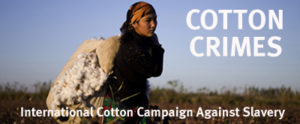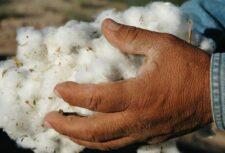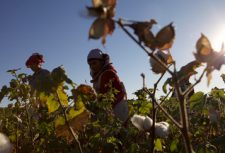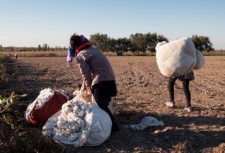Disclaimer: This article is more than 10 years old, and may not include the most up-to-date information or statistics. Please verify information with more recent sources as needed, and if you have any questions contact our Press Office.
28 November 2013

2013 cotton harvest in Uzbekistan with use of forced labour on big scale.
Review of the 2013 cotton harvest in Uzbekistan released by the cotton campaign.
The Uzbek government again systematically forced children and adults to pick cotton and farmers to produce state-established quotas of cotton in one of the largest state sponsored systems of forced labor in the world, states the “Review of the 2013 Cotton Harvest in Uzbekistan,” released today by the Cotton Campaign.
It is estimated that the harvest produced around 3.35 million tons of cotton, with the income estimated to total US$1.15 billion. Once again, the Uzbek government forced hundreds of thousands of children and adults into the fields in one of the largest state sponsored systems of forced labour in the world.
Following the policy shift from last year, the government generally avoided the mass mobilisation of younger children, but forcibly mobilised older children from secondary schools (15 to 18-year-olds) and adults.
Employees of hospitals and students of colleges were forced to sign documents stating that they will pick cotton “voluntarily”. There were reports of teachers showing up on the doorsteps of students with a police presence demanding that students to go to the fields or pay fines. Owners of private businesses were given the alternative of sending their staff to the fields or paying to employ someone to pick cotton in their place.
The harvest also claimed eleven casualties, including children. The youngest, a six-year-old boy, died after climbing into a trailer and falling asleep while his mother was working in the fields. Tragically, no-one noticed he was there, and when the cotton was loaded into the trailer at the end of the day he was suffocated under its weight.
As the 2013 Cotton Harvest Review details, the Uzbek government took extensive measures to conceal its use of forced labour from the international community.
First, the government attempted to create the impression that work in the cotton fields is voluntary. Prior to the harvest, the government inserted a clause in contracts for public-sector workers making work in the cotton harvest a condition of employment. School administrators required students and parents to sign commitments at enrollment that students would pick cotton. Throughout the country, authorities instructed children at schools and adults in their workplaces and communities to report to foreigners that they picked cotton “voluntarily” and “for the love of the motherland.”
As in previous years, the government silenced Uzbek human rights monitors through arrest, imprisonment and intimidation. For example, the authorities arrested and detained independent journalist Sergei Naumov for 12 days, and sentenced Bobomurad Razzakov, a farmer and human rights activist who has frequently represented fellow farmers’ interests before the prosecutor’s office, to four years imprisonment.
For the first time, the Uzbek government invited the ILO to monitor the cotton harvest. In July and September, the Cotton Campaign recommended that a monitoring mission include oversight of the mission by the independent bodies and civil-society participation. Instead, the government moved to limit the ILO monitors’ ability to fully examine forced labour.
In addition to coaching citizens on what to tell monitors, authorities instructed students to lie about their participation in the harvest, and education administrators returned students from the cotton fields to schools in anticipation of visits by the ILO monitors. As the harvest concluded, Tashkent distributed its own version of an information note prepared by the ILO monitoring mission in which the government blamed the victims, adding a sentence not contained in the ILO monitors’ version to the effect that any child labor during the harvest was “initiated by the children themselves and their parents-farmers, government agencies were not involved.”
Unfortunately, the ILO monitoring mission’s initial information notedid not conclude that there was systemic use of forced child labor.This reflects the limitations on the mission and contrasts with the voluminous, concrete evidence disseminated by the Cotton Campaign and its coalition members throughout the harvest and compiled in today’s report.
This month, the ILO Committee of Experts will review the situation in Uzbekistan. The Cotton Campaign encourages the Committee to consider the full range of evidence available and to set the record straight by making clear that again this year the Uzbek government required farmers to produce cotton and mobilized Uzbek children and adults in one of the largest state-sponsored systems of forced labor in the world. We also reiterate our call to the Uzbek government to end its forced-labour system of cotton production.
The Review of the 2013 Cotton Harvest in Uzbekistan is available here.
Full press release from the Cotton Campaign is available here.
Map of abuses in the 2013 Uzbek cotton harvest
The Cotton Campaign also set up an online map detailing places where forced labour abuses took place, detailing the nature of the incidents for each place as reported by the local human rights organisations’ monitors and by the media. You can visit the map here.
Note to editors:
The Cotton Campaign is a global coalition of labor, human rights, investor and business organizations coalesced to end forced labor of children and adults in the cotton sector of Uzbekistan.
Anti-Slavery International is working to put pressure on governments and the European Union to bring pressure to bear on the Uzbek government to stop its forced labour practices, as well as on international brands to boycott Uzbek cotton and cut business ties with all companies profiting from it. During the 2013 WOMAD festival alone, over a thousand signatures were gathered on a petition urging Nike to cut ties with Daewoo – one of the biggest exporters of the Uzbek cotton. The petition can be signed online at www.antislavery.org/cottoncrimes.
We also urge supporters to write to their MEPs to raise their concerns and urge them to stop trading preferences for the Uzbek cotton exports to the European Union. The sample letter and all the detailed information can be found at our Cotton Crimes campaign webpages .
For more media information or to arrange interviews, contact Anti-Slavery International’s Press Officer Jakub Sobik at j.sobik@antislavery.org or on 0207 501 8934.





